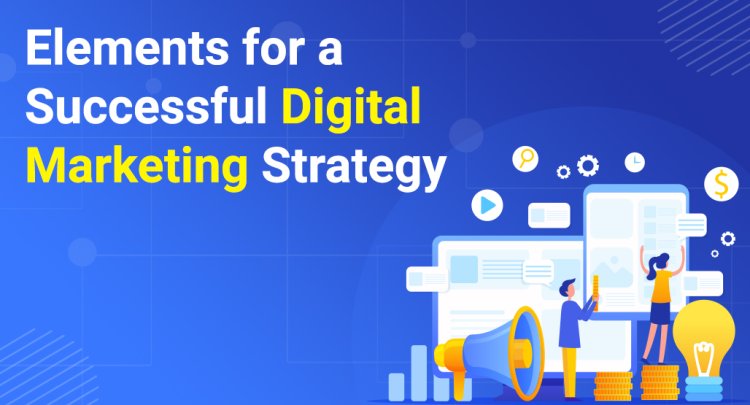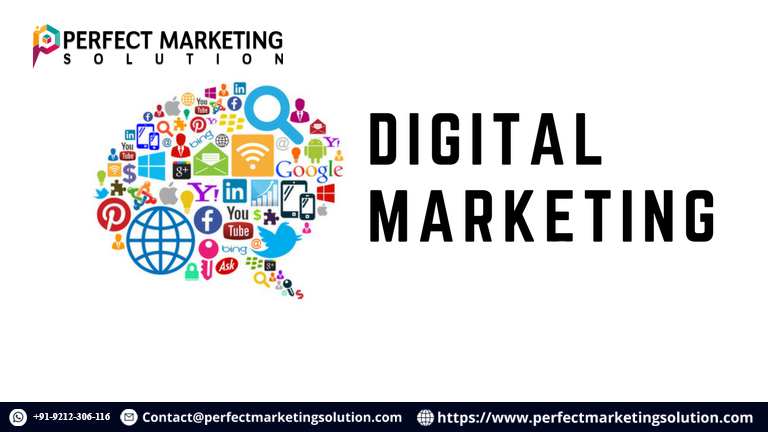Elements for a Successful Digital Marketing Strategy
In an increasingly congested digital arena, businesses and organizations of all sizes should look for inventive and creative ways to stand out and make an impression.

In an increasingly congested digital arena, businesses and organizations of all sizes should look for inventive and creative ways to stand out and make an impression.
Entrepreneurs and business owners must realize that a cookie-cutter digital marketing strategy will not work. To genuinely thrive in the digital sphere, you must develop a distinctive and effective plan that distinguishes you from the competition.
We realize that doesn't seem easy, but the good news is that we are here to help you. In this post, we've compiled a list of ten crucial aspects that will help you develop a unique and effective digital marketing plan.
Key Elements of an Effective Digital Marketing Strategy
These are ten critical factors for a good digital marketing plan that can help firms succeed no matter how competitive their sector or market is:
Customer Research
Conducting extensive research is critical for developing an effective digital marketing plan that speaks to your target demographic. This includes obtaining information on your customers' demographics, tastes, and habits to gain a thorough grasp of their demands and pain spots. Surveys, focus groups, social media listening, and consumer feedback can all help you uncover ways to improve your products, services, and marketing messages.
Clear goals and KPIs
Clear, measurable goals and key performance indicators (KPIs) are vital for tracking the success of your digital marketing initiatives. Remember that your goals should be SMART (specific, measurable, attainable, relevant, and time-bound). For example, if you aim to boost website traffic by 50% over the next six months, you'll need to analyse metrics like website visitors, bounce rates, time on site, and conversions.
Comprehensive Website Design and Development
Remember that your website is the foundation of your digital presence, and it must be well-designed and developed to attract and engage your target audience.
A digital marketing agency could be the ideal alternative for developing a website that meets the standards. Your website should be speedy, user-friendly, responsive, and search engine-optimised. A professional and visually appealing design, an easy-to-navigate structure, and relevant and high-quality content are all important components of generating a great user experience, which can help business owners boost the likelihood of converting users into customers.
Search engine optimisation (SEO)
For those who don't know, Search Engine Optimisation (SEO) is the process of optimising your website and content to rank higher in search engine results pages (SERPs). Effective SEO includes keyword research, on-page optimisation, link building, and other techniques. Keyword research allows you to understand the terms and phrases that your target audience uses to find items and services similar to yours. On-page optimisation is the process of optimising your website's pages, which includes meta titles and descriptions, headings, and content.
Link building is the process of obtaining high-quality backlinks from reliable websites to increase the domain authority of your website. By completing all of these steps, your website or landing page will be able to appropriately rank on SERPs.
Content Marketing
Creating excellent and relevant content is an effective approach to reaching and engaging your target audience. Remember to personalise your content to your audience's wants, preferences, and pain areas, and disseminate it across many channels such as blogs, social media, email, and video. Content marketing can take many forms, including blog posts, infographics, eBooks, seminars, and podcasts. It can help you position your business as a thought leader while also increasing trust and loyalty among your target audience.
Social Media Marketing
Social media sites such as Facebook, Instagram, Twitter, LinkedIn, and others are effective ways to connect with your target audience, raise brand awareness, and increase engagement. Effective social media marketing entails selecting the correct channels, developing a consistent brand voice, and connecting with your audience through valuable content and interactions. Content development, social media ads, influencer marketing, and community management are examples of both organic and paid social media marketing strategies.
Email Marketing
Email marketing is an effective strategy to nurture leads, develop customer connections, and increase conversions without breaking the bank. Your email marketing plan should include growing a high-quality email list, providing personalised content, and optimising your emails for optimal effectiveness. Personalisation and segmentation may assist in guaranteeing that your communications are relevant and tailored to your intended audience, whereas A/B testing can help you optimise your email content and CTAs for maximum engagement and conversion.
Paid advertising
Paid advertising allows you to contact your target demographic precisely and quickly. Effective paid advertising requires selecting the correct channels and formats, establishing clear goals and KPIs, and constantly monitoring and optimising your campaigns for optimum ROI. Paid advertising includes search ads, display ads, social media ads, and programmatic advertising. However, keep in mind that you'll need to track metrics like impressions, clicks, conversions, and cost per acquisition (CPA) to verify your campaigns are producing the expected results.
Emerging technologies
Emerging technologies like virtual reality (VR), augmented reality (AR), artificial intelligence (AI), and chatbots are fast reshaping the digital marketing landscape, therefore using them is essential. Integrate these tools into your digital marketing plan. Businesses can help your target audience have a more personalised and interactive experience. For example, adopting AI-powered chatbots can help you automate customer service and assistance, whereas VR and AR can improve the customer experience by providing immersive and engaging information.
Analytics and data-driven insights
Analytics and data-driven insights are critical for assessing the success of your digital marketing campaigns and identifying areas for improvement. Using tools like Google Analytics, you can monitor critical metrics like website traffic, bounce rates, time on site, and conversions. You can also use customer data to acquire insights into their behaviours and preferences, allowing you to tailor your marketing plan accordingly. By constantly analysing and optimising your digital marketing efforts, you can ensure that you're getting the best outcomes for your company.
How To Create Your Digital Marketing Strategy for 2024
Developing a successful digital marketing strategy needs study, planning, and competent execution. Take these steps:
Set goals and objectives
Define defined, quantifiable goals and objectives for digital marketing within a set timeframe. Align with company aims.
Research your audience
Use audience insights from previous campaigns, website analytics, surveys, and other data sources. Develop detailed buyer personas.
Audit your digital assets.
Examine the present state of your website, content, social media, and online presence. Identify your strengths and places for improvement.
Choose your digital channel.s
Determine the digital platforms and channels you will use based on your objectives, audience research, and competition analysis.
Plan Out Your Strategy
Integrate personas, content plan, budget, KPIs, and a calendar into a unified digital marketing strategy.
Execute and manage campaigns
Launch cross-channel campaigns to promote your content, offers, and messaging in line with the strategy. Optimise over time.
Track performance and ROI
Use analytics to track and analyse key performance indicators (KPIs) and returns across all activities. Adjust the underperforming regions.
Conclusion
A good digital marketing plan is essential for differentiating yourself from the competition, communicating with your target audience, and increasing sales. To do this, ten critical parts must be in place: thorough customer research, defined goals and KPIs, a well-designed website, successful SEO, content marketing, social media marketing, email marketing, paid advertising, developing technologies, and analytics. By using these aspects, you may establish a strong online presence and optimize your digital marketing efforts, resulting in the best potential outcomes for your company.
An agile, integrated digital marketing services approach is critical to success in 2024 and beyond. Use these guidelines and frameworks to create a data-driven strategy that is personalised to your company's needs and audience preferences. Your strategy will drive long-term development and value through continual optimisation and evolution.
What's Your Reaction?





















